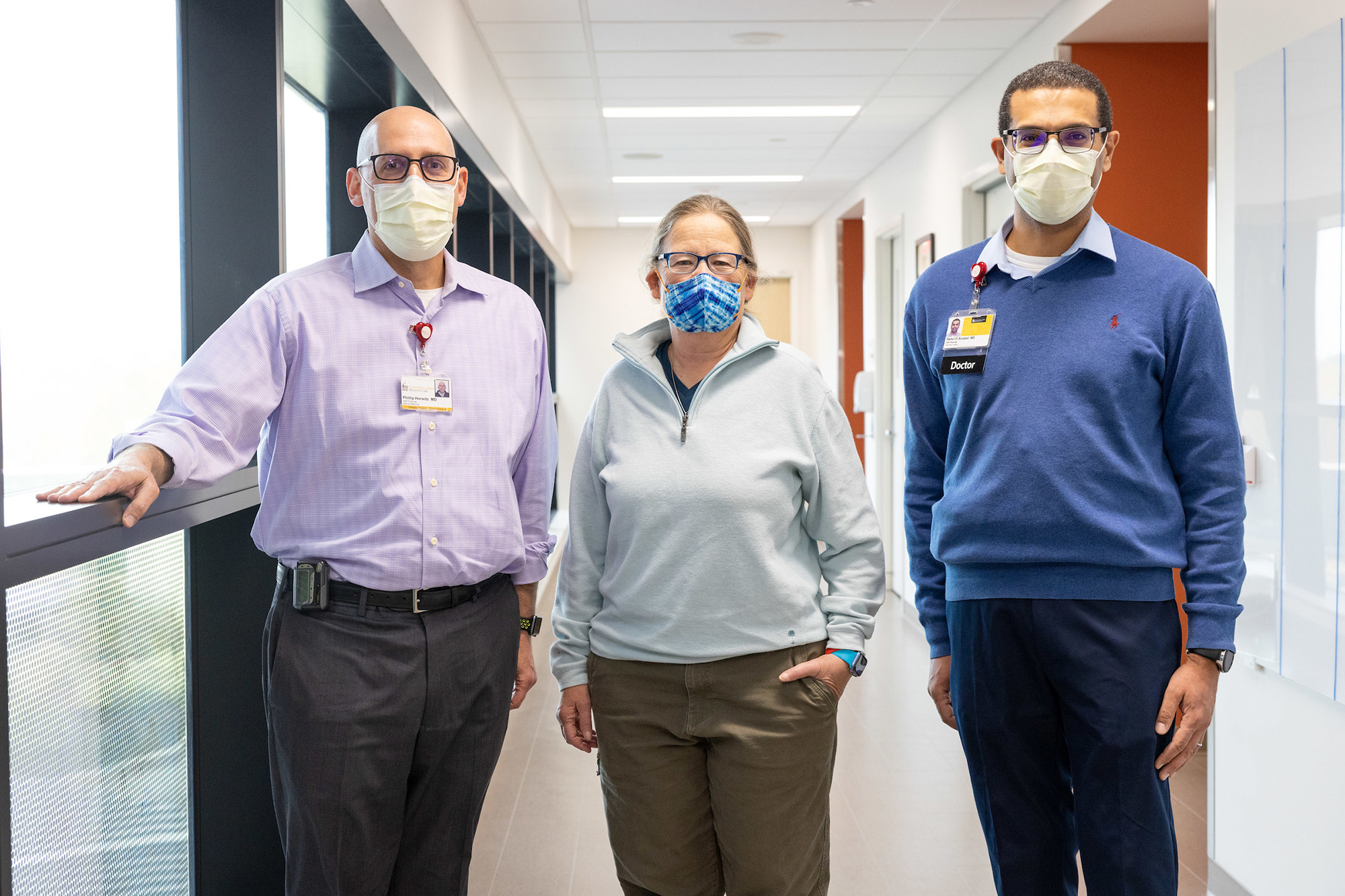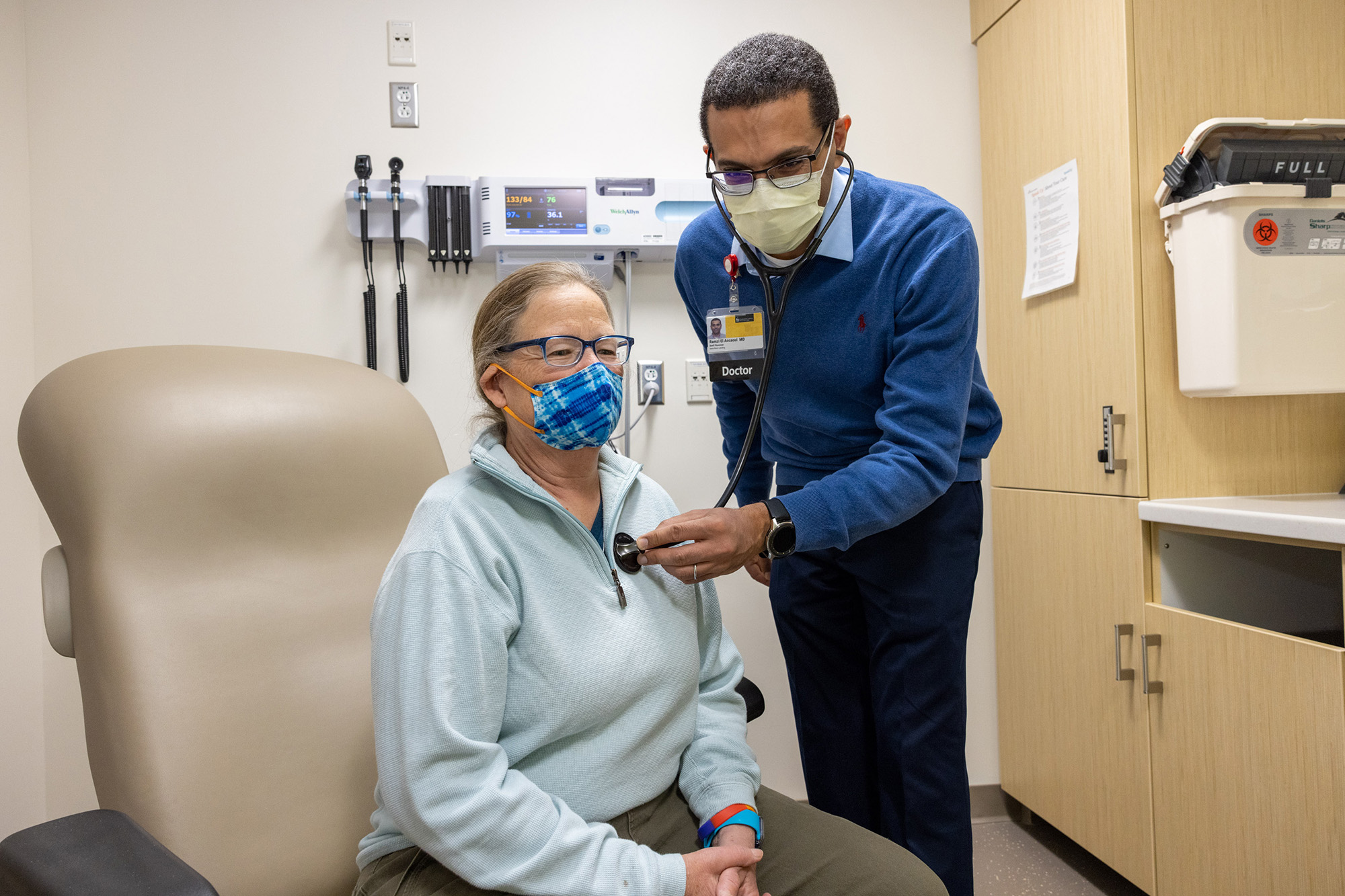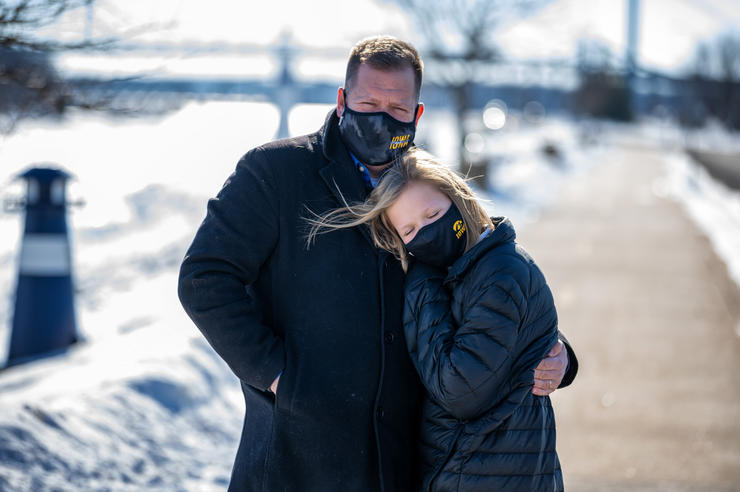Clinical trial participant receives new heart treatment

Jill Jack stands with UI Health Care cardiologists Phillip Horwitz, MD, (left) and Ramzi El Accaoui, MD. Jill was the first in Iowa to undergo a new, nonsurgical tricuspid valve repair at University of Iowa Heart and Vascular Center.
Jill Jack was a freshman in high school when she learned she’d been living on borrowed time.
Despite having no major symptoms, Jill was diagnosed with aortic valve regurgitation during a routine physical exam in the early 1970s. Her aortic valve would not close properly, causing some of the blood being pumped out of her heart’s left ventricle to leak backward. Left untreated, the condition could cause a host of physical symptoms, including infections and heart failure.
Doctors recommended Jill undergo open-heart surgery to repair the aortic valve—while cautioning that her chances of long-term survival were slim—because it was the only option at the time.
Jill made it through the surgery and was told she’d have another five to 10 years to live.
“Hopefully by then,” she remembers thinking, “the science catches up.”
Medical science and technology has indeed caught up. Today, catheter-based procedures are a minimally invasive option for some patients with heart valve problems—patients like Jill, who was the first in Iowa to undergo a new, nonsurgical tricuspid valve repair at University of Iowa Heart and Vascular Center.
If you have questions about your heart or blood vessel health, University of Iowa Heart and Vascular Center has answers. Our cardiologists, heart surgeons, and other providers care for people with atrial fibrillation, coronary artery disease, heart failure, peripheral vascular disease, and more.
The new tricuspid valve repair was made available through a clinical trial, which is a research study to evaluate a new therapy, medication, or device. Clinical trials at Iowa give patients access to new treatments typically not available at other hospitals. And in Jill’s case, it was the only option left to fix her leaky tricuspid valve.
A lifetime of heart surgeries
In the years following Jill’s aortic valve operation in the 1970s, she had two more open-heart surgeries—each about a decade apart and each meant to give her about 10 more years. By her third such surgery in the mid-1990s, Jill’s body was growing less resilient with age, and her options were running out.
When she was first seen in 2015 by University of Iowa Health Care cardiologist Ramzi El Accaoui, MD, the lifelong stress of Jill’s condition had caused additional damage to her heart. Now her tricuspid valve, which helps blood flow correctly from the right atrium to the right ventricle, was leaking, and she was showing signs of congestive heart failure.
With the risks of a fourth open-heart surgery outweighing the potential benefits, El Accaoui monitored Jill every few months and treated her symptoms with medication.
“There wasn’t much they could do for me,” Jill says.

“One of the advantages of having your care established here is the access to newer treatment options. Jill got early access because we’ve been following her for years.”
New treatment available through clinical trial
But in 2021, El Accaoui presented Jill with a new option—so new, in fact, that it was still in the testing phase. UI Heart and Vascular Center, the only comprehensive heart center in Iowa, had become the first in the state to offer a new, minimally invasive procedure to repair the tricuspid valve as part of an industry-sponsored clinical trial.
“One of the advantages of having your care established here is the access to newer treatment options,” says El Accaoui, UI clinical associate professor of internal medicine-cardiovascular medicine. “Jill got early access because we’ve been following her for years.”
Because clinical trials are research studies, the process to enroll a patient is rigorous. Jill’s case was thoroughly evaluated over the course of several weeks by a team that included a surgeon and a heart failure specialist before it was determined that the trial was her best option.
“Innovative technologies in complex patients require multidisciplinary [review],” El Accaoui says, “and a strong adherence to the guidelines of the trial.”
Minimally invasive approach offers major advantages in heart valve repair
The new transcatheter repair for tricuspid valve regurgitation is a procedure in which a cardiologist attaches clips to leaflets of the tricuspid valve to bring them back into alignment and reduce leaking. The repair is minimally invasive because doctors reach the patient’s heart using a very small catheter that enters a vein in the leg—rather than opening the patient’s chest. This type of valve clip procedure has already been approved by the U.S. Food and Drug Administration for the heart’s three other valves.
“This [technique] has been a revolution for other valves,” says cardiologist Phillip Horwitz, MD, executive director of UI Heart and Vascular Center. “Now we can extend the treatment to populations of patients that never could get it before.”
The approach is well-suited for patients whose tricuspid valves are severely leaky, who are having symptoms from their condition, and whose anatomy presents a reasonable likelihood of success. For patients whom open-heart surgery would be too risky, it’s a new treatment option when other options may be unavailable.
UI Heart and Vascular Center is the first and only center in Iowa to offer the clinical trial of the new transcatheter repair for tricuspid valve regurgitation. Clinical trial participants are still being recruited. Patients with tricuspid valve regurgitation may ask their provider for a referral to the Structural Heart Disease Program to be evaluated.
The minimally invasive transcatheter repair also means less trauma, less pain, and a faster recovery compared to open-heart surgery.
“Most of these patients go home the next day,” Horwitz says. “Many of them are back to normal activities in just a few days. Getting to the valve is so much less invasive. That’s the big advantage.”
UI Heart and Vascular Center first and only in Iowa to offer tricuspid clinical trial
Jill’s tricuspid valve repair, in December 2021, took about four hours. UI Heart and Vascular Care experts—which included a cardiologist, interventional cardiologist, cardiac surgeon, heart failure specialists, cardiac electrophysiologist, and a cardiac rehabilitation team—worked together before, during, and after her procedure.
Jill stayed in the hospital for a few days after her procedure before heading home to her 12-year-old son. She attended outpatient cardiac rehabilitation but says her overall recovery was minimal compared to that of her open-heart surgeries.
About five months after the procedure, Jill pulled her electric bike out of storage and started taking short rides on the paths in her neighborhood. By mid-summer she was kayaking and even climbing three flights of steps to get to the top of a water slide.
“I feel like it’s all on me now,” she says. “I want to make my heart stronger and get my body back.”


